The Daily Agenda: What's missing from this conversation?
Youth environmental activists and elected officials gathered Saturday ... Young people had a lot to say about climate action shortcomings ... Big change in the Big Apple.
We're handing over the top of today’s email to our intern, Kyra. She’ll be writing more for us in the next few months and we’re excited to bring her work to your inboxes.
Climate change is on a lot of people’s minds these days after Tucson and the rest of the state broke heat records all summer.
And while local and state officials are working to create policies and programs to address climate change, there are still voices being left out of the conversation.
Those voices belong to the young people who will spend the rest of their lives dealing with the mess climate change creates.
That’s why University of Arizona sophomore Ojas Sanghi and dozens of other local teens and young adults joined the fight this past weekend, participating in a climate protest and summit as part of the Global Fight to End Fossil Fuels strike.
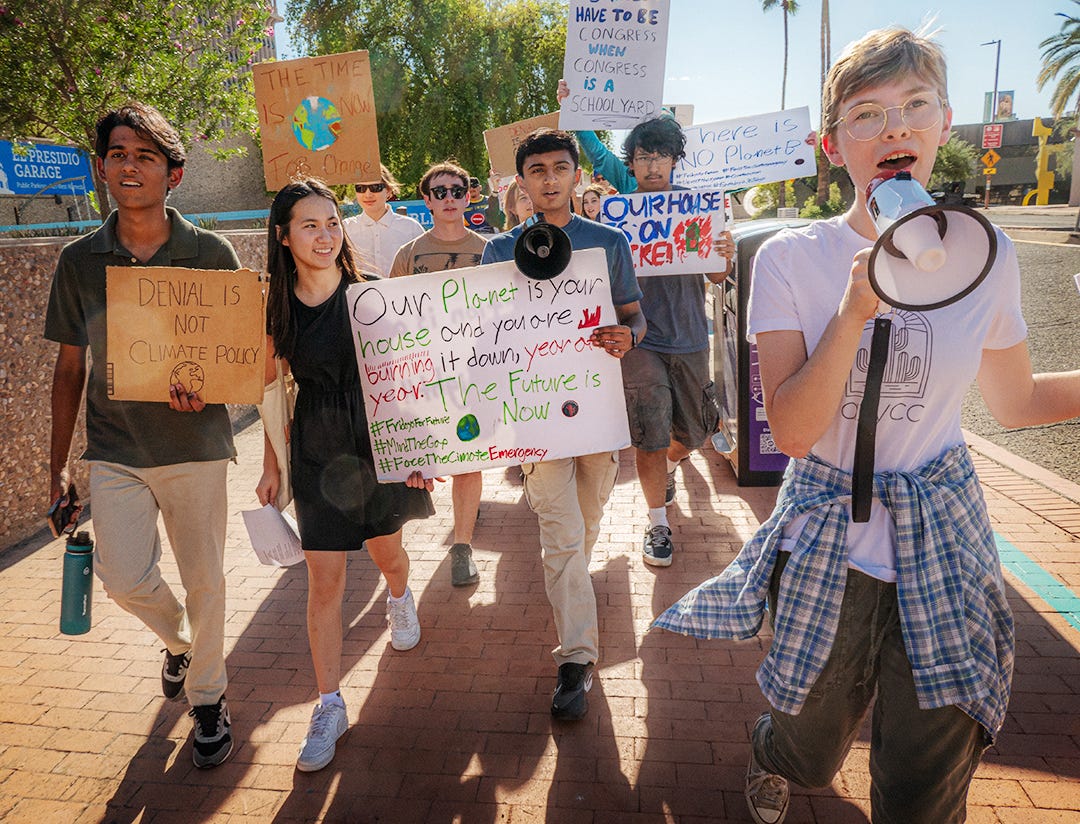
Sanghi is the Tucson co-lead of Arizona Youth Climate Coalition and co-outreach chair for UArizona Divest, two youth-led groups working to address climate change and sustainability issues.
“Youth are rarely invited to speak or intensively listened to on matters of climate policy,” said Sanghi. “So it falls to us to work to platform ourselves.”
The coalition has been working alongside state and local officials to create educational opportunities for the youth. Student-led group UAZ Divest works to encourage the school to align its finances with sustainability.
Over 100 youth climate activists, community members, and elected officials participated in the strike and summit, which took place last Friday and Saturday at Presidio Plaza and the UA.
The summit included a local panel, including Ward 3 Councilman Kevin Dahl, TUSD Board President Dr. Ravi Shah, Sanghi and several other students.
There was a second panel made up of several state and federal officials, including state Sen. Priya Sundareshan and former state senator and candidate for Arizona’s 6th Congressional District, Kirsten Engel.
Sex! Now that we have your attention, help the Tucson Agenda become financially sustainable by upgrading to a paid subscription. (Kudos to the young woman in the above photo for the clever sign.)
It’s no surprise that all the panelists agreed that climate change is real and must be accepted as such, saying it’s not actually a controversial issue and the misconception that it is needs to be addressed through education.
“Education is a really important place to start because when we educate our students at a young age, that the environment and world around them can be such a beautiful place, they get this sense of self that they need to protect the environment,” said University High School student Ella Healy. “That is how they become responsible voters and conscious consumers.”
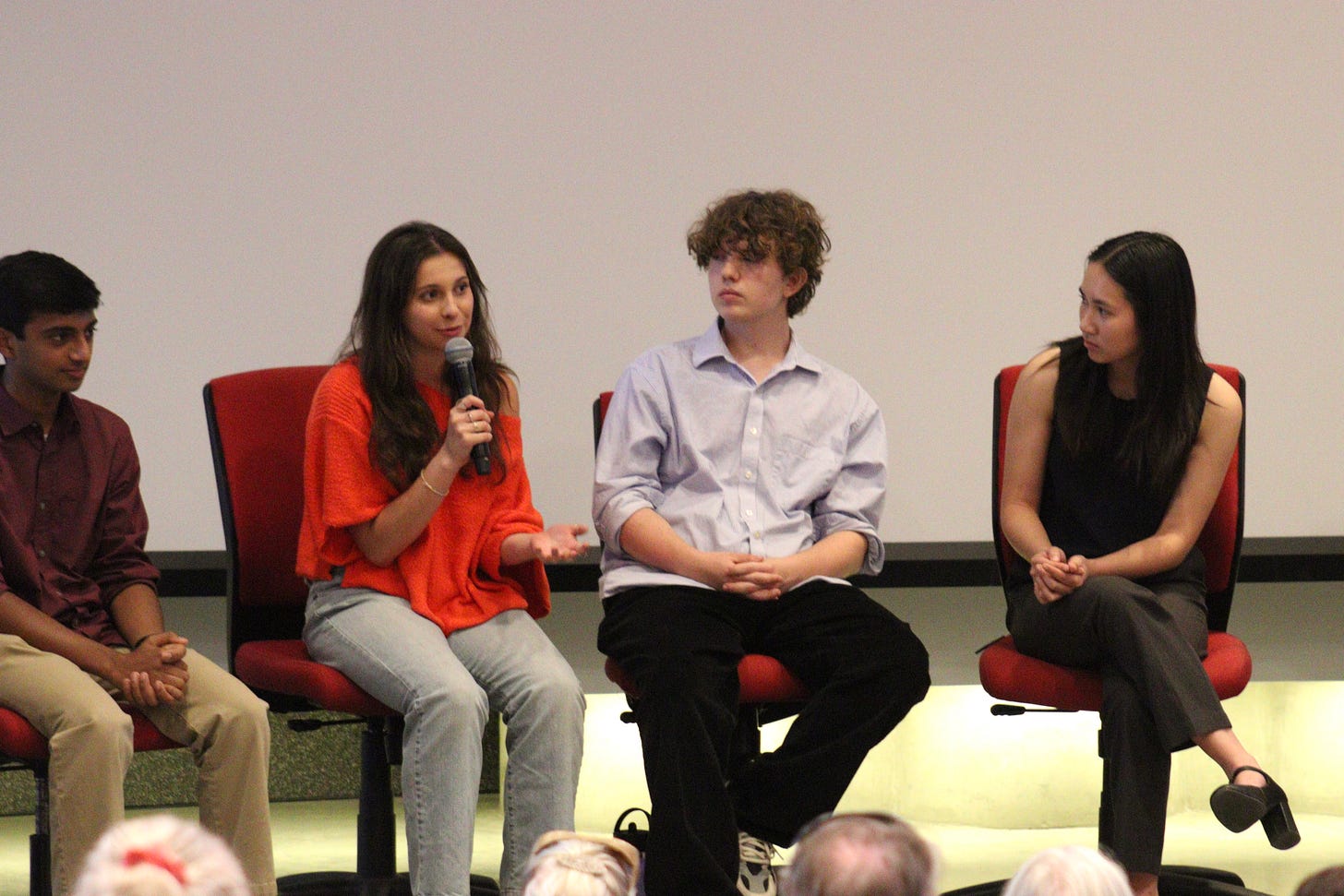
Healy, who drafted a sustainability curriculum plan for elementary and middle school students last year and is currently putting the curriculum into practice, said teachers must help students make a connection to the environment.
Dr. Michael Kotuwa Johnson, a member of the Hopi Tribe and assistant professor of the UA’s School of Natural Resources and the Environment, suggested a more hands-on approach to helping students appreciate the earth.
“I would like to see … a policy at the state and local level that we have every kid who comes into school given a cup, some soil, and some seeds to plant on their first day of class,” said Johnson. “Whether these things grow or not doesn't matter, but just the act of planting. And as a Hopi, planting is a demonstration of faith and a way to hook our young children into this environment.”
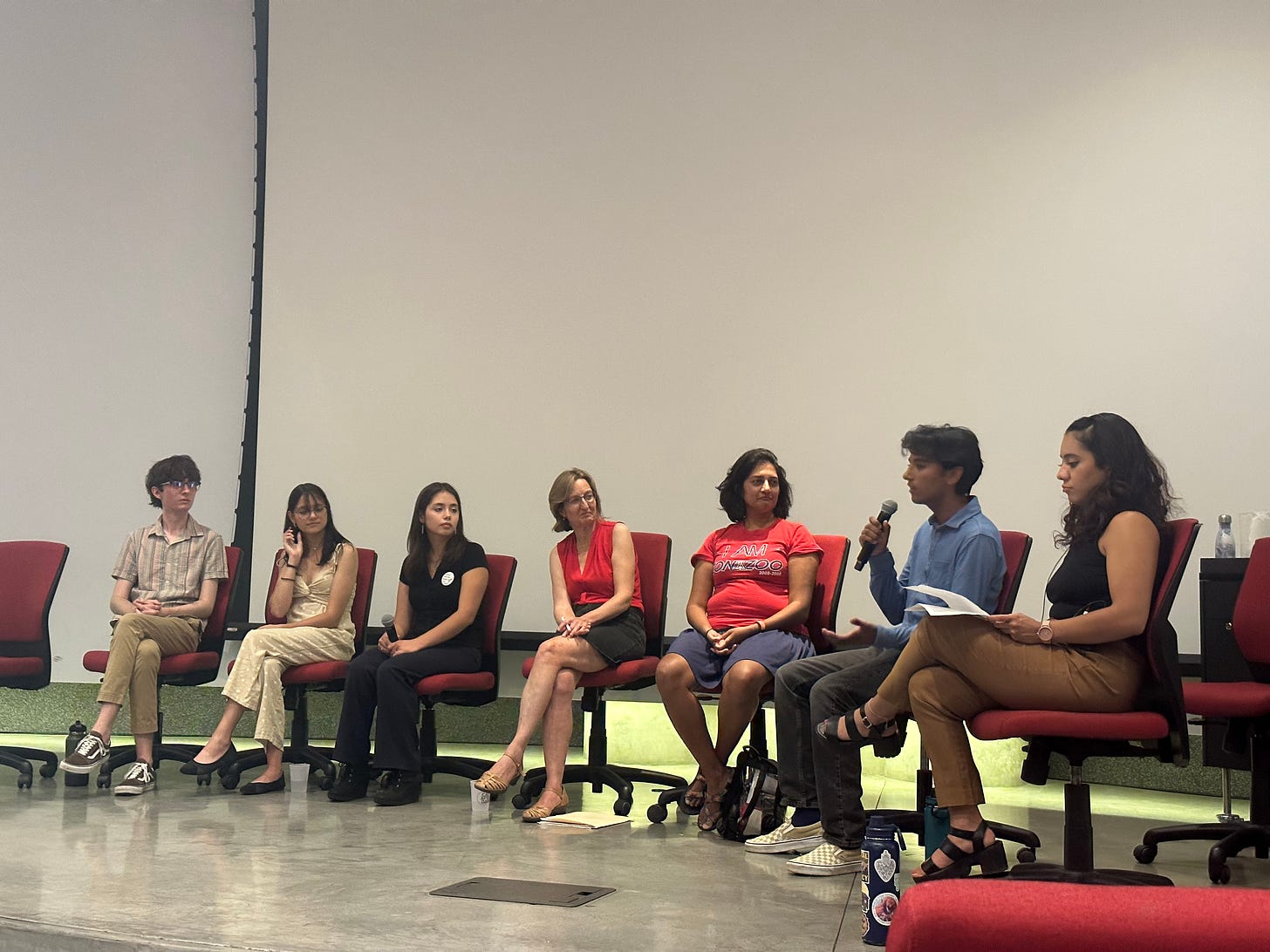
While the panelists brought their own ideas and expertise to the conversation, they all agreed that developing effective solutions to address climate change will take a collective force, and that means inviting teens and young adults to the table — and listening to their ideas.
“I think that older people need a fundamental belief in the ability of the youth,” said Tanish Doshi, a junior at BASIS Oro Valley and outreach coordinator for the coalition.
Doshi is living proof of that ability, as he also serves as vice president of the Oro Valley Youth Advisory Council and co-chair of the Governor’s Youth Commission, which works to identify and address the greatest challenges facing youth in the state.
“We need to not just be seen as the figureheads, not just to be seen as someone who can stand beside you at a press conference, but somebody who could be speaking,” Doshi said. “Somebody who can make change on their own, who has the agency and the intelligence and the ability to have opinions that are informed and the ability to want those opinions to be carried out in policy.”
The Arizona Youth Climate Coalition already has the ears of city officials, with Ward 3 Councilman Dahl letting the group use his office for their meetings and Mayor Regina Romero and council members regularly inviting the group to weigh in on issues and speak during council meetings.
And shouldn’t young people be a part of the conversation? It only makes sense that they help shape policies, given that they’ll be around longer than the folks voting on those policies.
But it’s going to take more than the City of Tucson to fight climate change and while we’re happy to see a handful of state and federal officials taking young voices into account, we’re going to need a whole lot more to get on board.
Hear what they have to say: Candidates for Tucson City Council will speak at a forum on Sept. 30 and the mayoral candidates will do the same on Oct. 7, the Tucson Sentinel’s Jim Nintzel reports. Seats for Wards 1, 2, and 4, along with the mayor’s office, are up for grabs in the Nov. 7 election. The forums are free to attend.
Who’d like to run Vail?: If the Vail incorporation effort wins in November, the Pima County Board of Supervisors will appoint a seven-member town council. They will serve until an election in May, Pima County Administrator Jan Lesher wrote in a memo. You just have to be 18 years old, registered to vote, and a resident for at least 12 months at an address within the proposed boundaries to apply.
Big change in the Big Apple: The Biden administration will allow about 472,000 Venezuelans who arrived in the U.S. before July 31 to work legally. That could lessen New York City’s financial costs as 110,000 asylum seekers arrived over the past year, many from Venezuela. The mayor and governor of New York had criticized Biden for not acting swiftly to relieve the cost of housing thousands of asylum seekers. With work permits, Venezuelan asylum seekers will be able to start moving out of city shelters.
Pressure release: Those work permits for Venezuelan asylum seekers could ease pressure on the federal funds needed by border states like Arizona, especially as the Border Patrol releases migrants on the streets and Tucson shelters are strained, as the Sentinel’s Paul Ingram reports.
But not out of the woods yet: The rise in people crossing the border in Southern Arizona led to the reassignment of customs officers, who staff legal ports of entry, to areas where the Border Patrol needs help processing people. That led to the closure of lanes in Nogales and doubled the wait times, KOLD’s Alex Valdez reports.
Sober living scammers: In what appears to be the next chapter in the statewide scam to take advantage of homeless people, nearly 200 people on Tucson’s south side are facing eviction. They were part of a sober living program, Happy Times, but the program suddenly stopped paying the hotel for them to live there, the Arizona Daily Star’s Nicole Ludden reports. One man, Leonard Carrillo, Jr., said he’d been sleeping at Santa Rita Park before he joined the program.
“This is our safe haven. They’re gonna kick us out, and then we’re all gonna be out on the street, it’s dangerous. It’s really not right what they’re doing,” Carrillo told Ludden.
1,078,500: The number of diesel gallons saved in 2023 by the City of Tucson's use of buses powered by electricity and compressed natural gas.





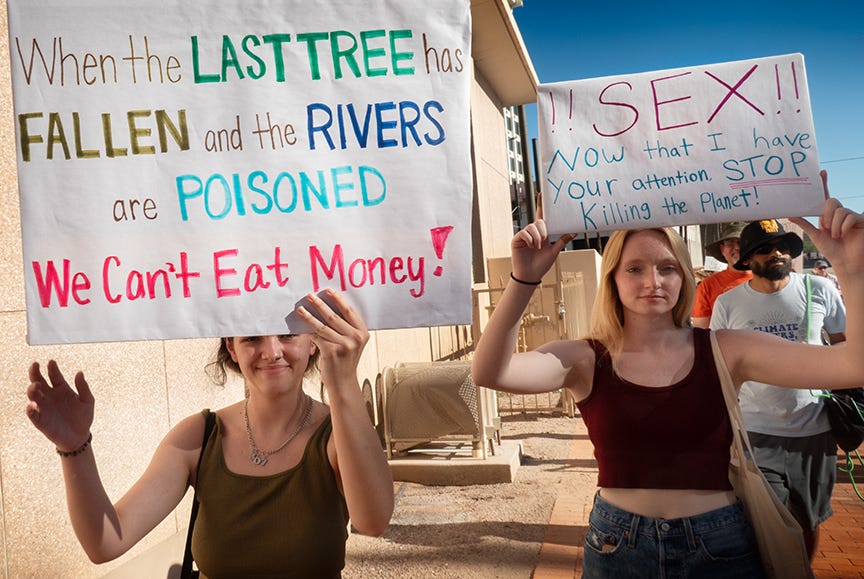
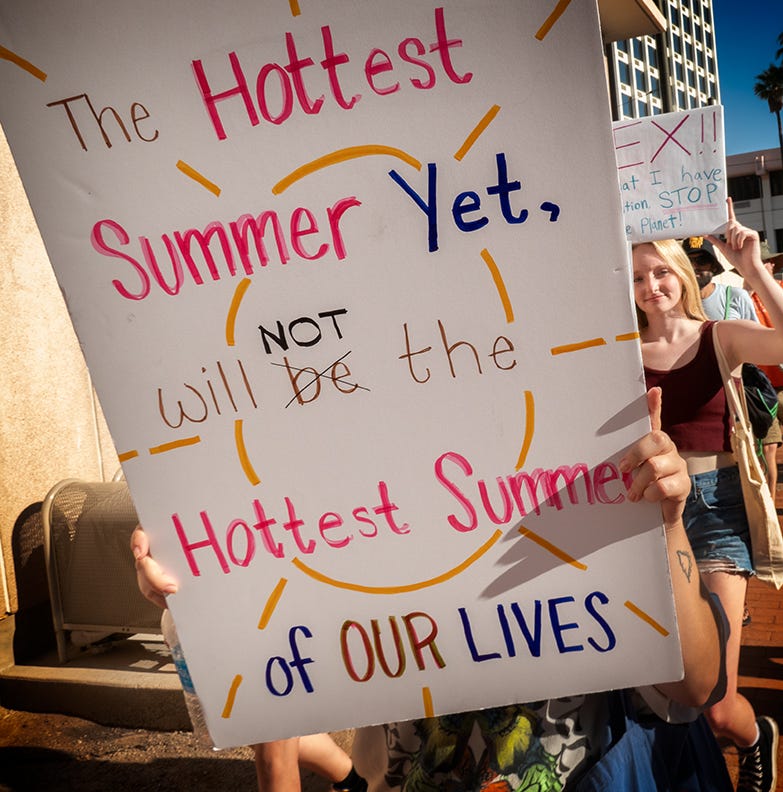





Thanks for an extensive report of the climate change action and gathering. I hope Tucson’s role in recognizing the voices of younger generations becomes a model that is followed in Arizona and across the country. I well remember when the voices of younger people who opposed the Vietnam War were shut out. Today, younger people are taking this challenge every bit as seriously.